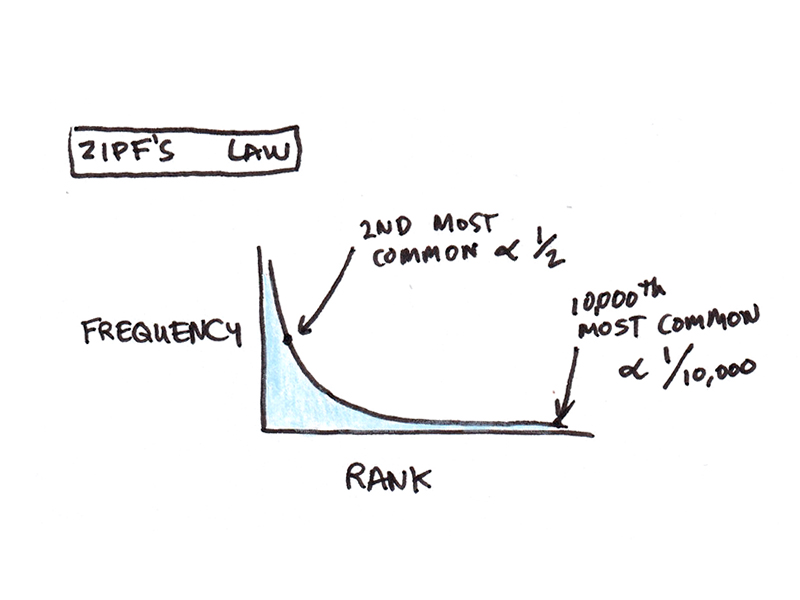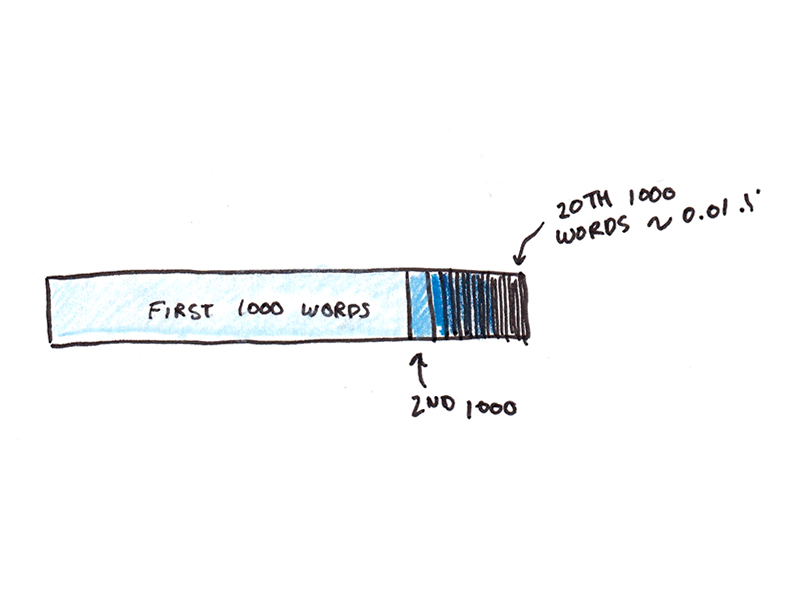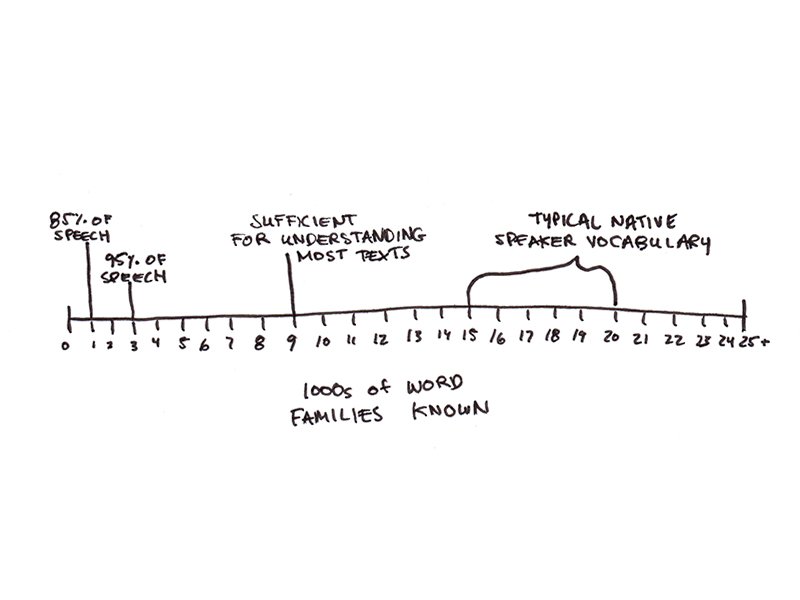On the subject of language studying, grammar will get all the eye. Most theories about second language acquisition focus totally on how we purchase syntax—the best way we put phrases collectively to kind sentences.
Vocabulary, in distinction, has traditionally been outdoors of the highlight. That is unlucky. Analysis has proven that your vocabulary has the best impact on comprehension.1 A serious problem college students have in studying a brand new language is the sheer quantity of recent phrases.
Given its significance, I used to be happy to come across Stuart Webb and Paul Nation’s How Vocabulary is Realized, a research-based handbook for academics that appears at the best way to take care of one of many central difficulties in turning into fluent.
How Many Phrases Do You Must Know?
Step one in any journey is determining how far you’re out of your vacation spot. What number of phrases do it’s good to study to be fluent?
Instantly, this query runs into problem. How ought to we depend phrases?
A method can be to depend each distinct spelling in a set of texts. Besides, this method drastically overcounts. It will embody regional spelling variations (e.g., colour within the US, color within the UK) in addition to quite a few grammatical inflections which are virtually actually not saved within the mind as separate phrases (e.g., troublesome, problem, difficulties, and so forth.).
As an alternative, researchers often desire to depend phrase households—which embody not solely distinct phrases, but additionally their associated inflections, variations in spelling and derivations.
What number of phrase households do it’s good to know?
Right here, we will benefit from an empirical discovering referred to as Zipf’s regulation. This regulation states that if we rank each phrase in a language so as from most-used (rank = 1) to next-most used (rank = 2) to least-used (rank = n), a phrase’s frequency of use is proportional to the inverse of its rank.

Which means that the frequency of the second most typical phrase can be roughly equal to 1/2 occasions some fixed. In distinction, the frequency of encountering the ten,000th most typical phrase can be roughly equal to 1/10,000 occasions that very same fixed. We might anticipate to see the second most typical phrase 5000 occasions for every time we see the ten,000th one.
The primary 1000 phrase households in English, as an example, account for roughly 85% of the phrases encountered (e.g., child, cake, dad), and the following 1000 account for less than 4.3% (e.g., background, accent). By the point you get to the twentieth batch of 1000 phrases, they make up lower than one-hundredth of 1 % of the obtainable phrases (e.g., abaya, chiastic).

Figuring out simply the primary 2000 phrase households would cowl roughly 80-90% of most novels, newspapers, conversations, tv exhibits and educational lectures.
The upside of this discovering is which you could shortly get to the purpose the place you understand a lot of the phrases getting used.
The draw back is that low-frequency phrases are sometimes important for understanding what’s being mentioned. Native English audio system are likely to know between 15,000 and 20,000 phrase households. Since most of these phrases happen more and more occasionally, the quantity of publicity wanted to study all of them correctly will be staggering.
What, then, ought to a practically-minded language learner concentrate on? Webb and Nation recommend two targets may be necessary:
- Figuring out 3000 phrase households “would enable learners to grasp 98% of the phrases in most graded studying supplies, in addition to 95% of the vocabulary utilized in spoken discourse.” Figuring out 95% of the phrases used is commonly thought-about the edge for understanding, so studying the 3000 most typical phrase households is an efficient newbie aim.
- Figuring out the 9000 most steadily used phrase households, which embody each low- and mid-frequency phrases, “equates to ample vocabulary data to grasp speech and writing,” Webb and Nation proceed, arguing that “differentiating between the phrases earlier than and after this level is beneficial.”
How Ought to You Be taught Phrases? The Energy of Intensive Publicity
On the subject of our native languages, researchers have already got a reasonably good thought of how we study phrases, and it’s not by means of learning vocabulary lists.
In a celebrated collection of papers, William Nagy, Richard Anderson and Patricia Herman discovered that faculty youngsters add as many as ten new phrases to their vocabulary per day for a number of years.2
Sustaining such a tempo with express educating can be subsequent to unattainable, and but native audio system not solely study this many phrases—they combine them seamlessly into their precise language use.

Clearly, the method of studying phrases in a single’s native language just isn’t like memorizing definitions from a dictionary. It’s not as if native audio system are being assigned ten phrases day-after-day to memorize. As an alternative, their in depth publicity to phrases of their atmosphere lets them steadily accrete data of recent phrase meanings in order that, averaged over lengthy intervals, they study roughly ten new phrases per day.
This alone exhibits that long-term publicity to an immersive linguistic atmosphere is sufficient for vocabulary development.
Nonetheless, native audio system additionally accumulate tens of 1000’s of hours of significant language enter and use—excess of most individuals can obtain learning a overseas language!3
Ought to You Use Flashcards to Be taught Vocabulary?
Intensive publicity is ample for vocabulary studying. But, given the massive amount of talking, studying, and listening time one will get with a local language, publicity alone might not be sufficient for the standard language pupil.
Flashcards provide a fast and efficient strategy to purchase a big vocabulary, particularly when the meanings of phrases will be readily paired with their counterparts in a single’s native language. Spaced repetition methods, like Anki, additionally provide the chance to retailer giant libraries of playing cards and permit opinions to be queued in order that studied phrases received’t be forgotten.
Nonetheless, flashcards for single phrases even have disadvantages. Studying a phrase in isolation could cause you to overlook its connotations or utilization specifically contexts. Playing cards that concentrate on a phrase household can also omit among the potential grammatical modifications of the phrase and their meanings.
Cautioning on the unique reliance on flashcards, Webb and Nation write:
“It’s also necessary to keep in mind that studying with flashcards is just one step within the vocabulary studying course of. … Flashcards must be supplemented with loads of meaning-focused enter that features the goal phrases to supply fashions for a way these phrases are used, and meaning-focused output that gives alternatives to make use of them.”
Different Recommendation for Studying Phrases
Webb and Nation assessment another recommendation on studying vocabulary:
- Phrases with comparable meanings must be taught on separate days. Lecturers usually cluster phrases by classes (e.g., days of the week, colours, occupations, and so forth.), however analysis signifies this can be unwise. College students present larger interference when gadgets with comparable meanings are taught in the identical classes.
- Graded readers can speed up implicit studying. To efficiently guess the which means of a brand new phrase from its context, we have to perceive between 95% and 98% of the encompassing phrases. That is troublesome to realize with native-level supplies. Graded readers, which intentionally restrict vocabulary, will be useful right here.
- The speed of vocabulary acquisition relies on pupil enthusiasm and aptitude. Webb and Nation recommend {that a} devoted pupil would possibly purchase 400 phrase households per 12 months, assuming they’re uncovered to the phrases in numerous contexts. For narrower phrase studying, comparable to from flashcards, extra phrases can doubtlessly be coated in an identical time-frame.
- Learners ought to spend time on all 4 pillars of language studying:
- Which means-focused enter. This contains conversations, books, movies, tv and different media that you simply attend to primarily for his or her which means. Enter offers the uncooked knowledge for studying new phrases and enriches the contextual associations of phrases studied intentionally elsewhere.
- Which means-focused output. Talking and writing are harder than merely understanding explicit phrases from enter, as utilizing phrases appropriately requires a extra exact data of every phrase and its which means.
- Language-focused studying. That is the deliberate act of memorizing phrases, learning flashcards, or receiving explanations about phrase meanings. Webb and Nation argue that this could account for ~25% of the time spent studying a language.
- Fluency growth. Lastly, consideration must be paid to actions that velocity up the understanding and manufacturing of phrases already identified. Acquainted supplies that allow fast studying or conversations on acquainted matters might not be wanted to construct new vocabulary, however they reinforce what was realized beforehand.
Footnotes
- Laufer, Batia, & Donald D. Sim. “Measuring and explaining the studying threshold wanted for English for educational functions texts.” Overseas Language Annals 18, no. 5 (1985): 405–411.
- Nagy, William E., Patricia A. Herman, and Richard C. Anderson. “Studying phrases from context.” Studying analysis quarterly (1985): 233-253.
- It’s not totally clear what cognitive mechanisms underlie this studying. It’s potential that we study the meanings of phrases implicitly by means of their contextual associations. However it’s additionally potential that aware efforts to puzzle out the which means of phrases play a task, too.

